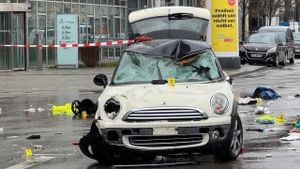High Representative of the European Union for Foreign Affairs and Security Policy Kaja Kallas has made it clear: any peace agreement to end the war in Ukraine must include participation from both Ukraine and European nations. Speaking to journalists prior to the NATO Defense Ministers’ meeting, Kallas firmly stated, "Any agreement without us will fail because Europe and Ukraine are needed to also implement the agreement. Without us at the negotiating table, you can agree on anything, but it will fail due to lack of implementation."
This statement was prompted by the recent announcement from U.S. President Donald Trump, who revealed intentions to initiate negotiations with Russian President Vladimir Putin. Kallas expressed her concerns about backdoor negotiations excluding Ukrainian perspectives, arguing, "If an agreement is made behind our backs, it simply will not work. With any agreement, you need the Europeans and the Ukrainians to implement it."
Kallas emphasized the pitfalls of seeking quick fixes during negotiations, recalling previous unsuccessful attempts such as the Minsk agreements. "Any quick fix will be just a dirty deal, which we’ve seen before, and it won’t stop the killing or the war," she underlined passionately. This urgency echoes her historical comparisons, likening the current climate to pre-World War II Europe. She stated, "We are in a situation where the Czech Republic decided to fight back, and we must help Ukraine defend itself against aggression to avoid broader conflict.”
The backdrop of these discussions includes Trump’s call with Putin, which reportedly took place on February 12. Following this call, Trump spoke with Ukrainian President Volodymyr Zelensky, raising apprehensions about Ukraine possibly being sidelined as these high-level talks progress. Kallas’ apprehension also taps deep-seated historical fears, reminiscent of the 1938 Munich Agreement where Europe failed to include significant voices against the growing threat of Nazi Germany. She remarked, "An appeasement strategy doesn't work, and I think the parallel can be made with 1938."
European officials, including Kallas, are proactively seeking involvement as discussions seem poised to accelerate. Following talks with foreign ministers from France, Germany, Spain, Italy, Poland, and the UK, Kallas reaffirmed Europe’s commitment to maintaining Ukraine's territorial integrity and insisted on European and Ukrainian involvement going forward. European Council President Antonio Costa supported this viewpoint, emphasizing, "There will be no credible and successful negotiations, and no lasting peace, without Ukraine and the European Union." He echoed the sentiment of interlinked peace between Ukraine and the broader security of Europe, insisting, "Peace cannot be simply a ceasefire. Russia must no longer be a threat to Ukraine, Europe, and international security."
Concerns escalated following remarks from the Trump administration, which indicated it might rule out Ukraine's pre-2014 borders and rejected NATO membership for Ukraine, raising alarms about Western support being compromised at this precarious juncture. Kallas countered this stance decisively, stating, "We cannot rule anything out before the negotiations have started because it only plays right to the hands of Russia, and that's what they want. Why are we giving them everything they want before negotiations have even started?"
The upcoming Munich Security Conference is set to gather pivotal figures including Kallas, Zelensky, and U.S. Vice President JD Vance, where discussions will likely focus on affirming unified support for Ukraine and addressing the parameters of any potential negotiations.
At this juncture, the EU’s position remains steadfastly clear: the involvement of Ukraine and Europe is indispensable for any pragmatic approach to achieving lasting peace. Kallas’ remarks reflect not just the determination of EU diplomats but also serve as cautionary notes against complacency and hasty withdrawal of support. The sentiment resonates through the halls of European governance as efforts consolidate toward ensuring comprehensive participation and accountability within any proposed peace frameworks concerning Ukraine.



